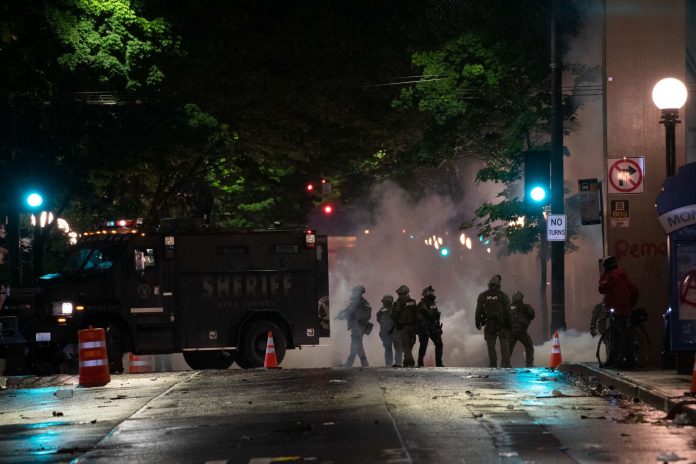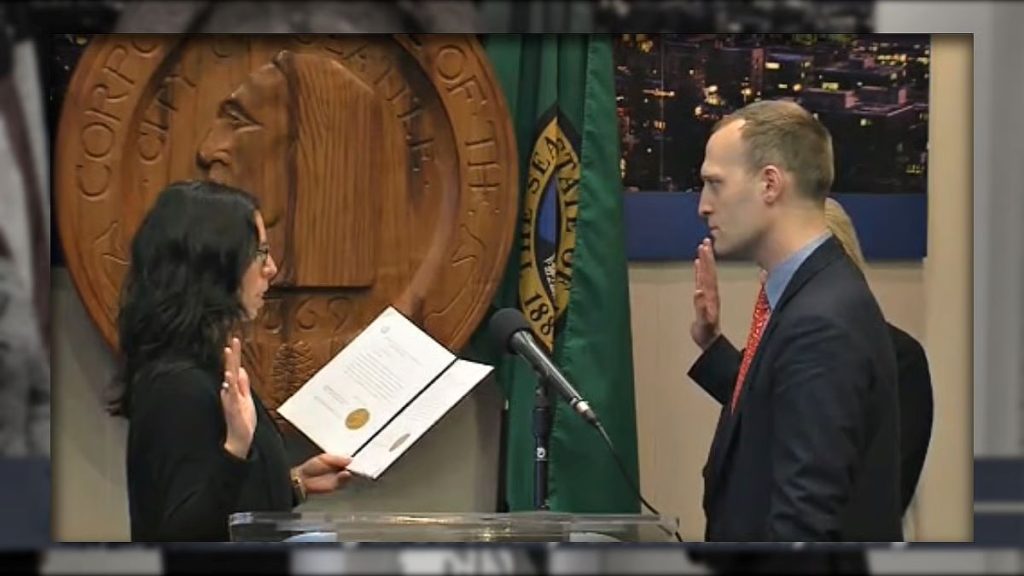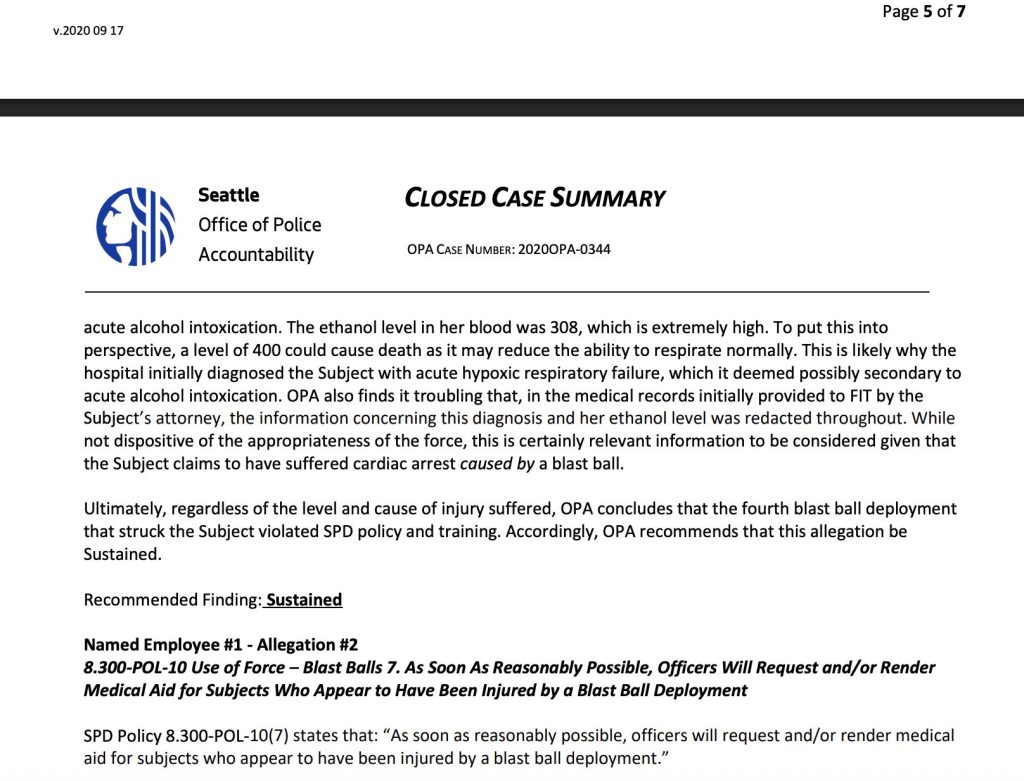
Key questions remain, such as how police first obtained sensitive medical information and why the report into their illegal disclosure was buried so long.
In the wee hours of the morning on June 8, 2020, Seattle Police Department (SPD) Officer Carl Anderson tossed a blast ball at a line of Black Lives Matter protesters.
The ball hit a young woman in the chest, exploding on impact.
She crumpled to the ground. It was thanks to a group of street medics that she did not die. They did their best to keep her alive, and managed to bring her to Virginia Mason hospital, amidst a barrage of “less lethal” weapon assaults by police officers. Her heart stopped multiple times.
The case was one of the handful that garnered significant attention, and that the Office of Police Accountability (OPA) investigated. In January 2021, the OPA’s now-former director Andrew Myerberg released his findings in a closed case summary.
Those findings contained the protester’s private medical information, somehow obtained by SPD Force Investigation Team (FIT) officers, and transmitted to the OPA for use in its official findings. Myerberg also used these findings to cast doubt on whether it was the shock of the exploding blast ball or the protester’s blood alcohol level that was responsible for stopping her heart, and thereby used this private medical information to exonerate the officer of a use of force that nearly killed her.
Trouble is, the protester never consented to share her unredacted medical information with anyone.
The protester’s lawyer, Sarah Lippek, filed a complaint against Myerberg and the then-unknown SPD officers who had obtained her client’s information.
What followed was a slow, opaque process that culminated in a final investigative report into Myerberg’s decision to release that private, unredacted medical information, and certain SPD officers’ obtaining and disclosing those same records. The report finally, after more than four years, reveals the identities of the officers who appear to have played some role in obtaining those medical records, in the first place.
The report sustains significant medical privacy violation allegations against both Myerberg and these SPD officers. At the time of the investigation, Myerberg served as Mayor Bruce Harrell’s director of public safety. He has since changed roles, and currently serves as the mayor’s chief innovation officer.

The obtaining and disclosing of the protester’s private medical records was one of the myriad serious allegations against the OPA and OIG in a 2021 whistleblower complaint. The City of Seattle never overtly did anything about these allegations, and dismissed the complaint, despite extensive reporting on the matter that appeared to support many of the allegations within.
The City of Seattle hired outside firm, Seyfarth Shaw, LLC, to investigate Myerberg’s and the SPD officers’ actions, after Office of Inspector General (OIG) head Lisa Judge recused herself, due to a conflict of interest. Seyfarth Shaw is a decades-old global firm that ranks as one of the largest law firms in the United States, and one of the highest-grossing in the world.
While the reasons for the conflict are still unknown, according to multiple records The Urbanist obtained, Judge was still directly involved with directing and coordinating the investigation through her office.
It is unclear why, if Judge had to recuse herself, due to a conflict of interest, she was still involved at all with the investigation, particularly since — following her recusal — the handling of the complaint bounced through different City offices.
The report and its information were hard-won. The report has been finalized and available since October 26, 2023. The City of Seattle did not release the significant findings of the taxpayer-funded investigation, which cost Seattleites at least $50,000, if not more. The City also appears to have attempted to withhold the investigation findings in multiple records requests.
After receiving the investigator’s conclusions, the Mayor’s Office sought a second opinion. That second opinion was formed by Jeremy Racca, who works as Mayor Bruce Harrell’s chief of staff and general counsel, in consultation with Pacifica Law Group, LLC, as outside counsel.
In an email to Judge, Racca wrote that he ultimately disagreed with the Seyfarth Shaw investigator’s conclusions.
When asked why the Mayor’s Office sought another opinion, spokesperson Jamie Housen wrote that “the Mayor’s Office had outstanding questions after reviewing the report.” When asked whether it is usual practice to seek another opinion in such matters, the Mayor’s Office said that “[t]his is the first time that an investigation regarding a former OPA director has been sent to the Mayor’s Office, but broadly speaking, it’s not uncommon for the Mayor’s Office to seek advice from outside counsel on complex legal matters.”
The Mayor’s Office said that it did not have on hand how much this second opinion cost, but did not respond when asked what outstanding questions it had about the report, or whether it had ever sought outside counsel in other investigations involving high-profile Seattle officials.
The Mayor’s Office also did not respond, when asked whether it was definitively accepting Racca’s conflicting analysis as the final conclusion over Seyfarth Shaw’s investigatory conclusions, or whether it would order a new investigation, given the conflict.
The office also did not respond, when asked when the City sought a second opinion, and what the timeline for the consultation with Pacifica Law Group looked like.
Recused OIG head continues to be involved
In the public-facing closed case summary that spurred Lippek’s complaint — and that remains up as of May 26, despite the 18 months that have passed since the investigation’s findings — Myerberg publicly disclosed the protester’s blood alcohol level, and stated in his official findings that it could have been her blood alcohol level that stopped her heart. Myerberg stated this, despite not being a trained medical doctor, and based his determination on a Mayo Clinic webpage.

Following Lippek’s complaint in early 2021, regarding improper obtention and disclosure of the protester’s medical records, the City of Seattle hired private firm Seyfarth Shaw to investigate the case in late 2021.
Lippek originally filed the complaint with the Office of Inspector General (OIG), one of the City’s accountability partners that is responsible for overseeing the management, practices, and policies of SPD and the OPA.
The decision to hire Seyfarth Shaw followed a months-long stall between the OIG receiving the complaint; Inspector General Lisa Judge recusing herself; and the case’s subsequent move through different departments, unbeknownst to Lippek or the protester.
The slow progress and lack of transparency of that investigation was detailed in March 2022 reporting and a November 2022 follow-up article.
Despite Judge’s apparent recusal, a June 25, 2021 OIG email to Lippek reads, “Our office [OIG] determined there was a potential for a conflict of interest with Lisa Judge being the deciding official on the investigation.” Records The Urbanist obtained show that Judge met with the Seyfarth Shaw investigator, and that she was still involved in the case.
For instance, on May 16, 2022, OIG employee Mattias Gyde wrote to the Seyfarth Shaw investigator, “Would you have time this week for a meeting with myself and IG Judge to finalize moving forward with interviews and just generally discuss the investigation so far? Wednesday after 2pm looks good for both of us. If Wednesday is not good for you, please feel free to recommend some alternate meeting times.”
Another record from June 30, 2022, shows that someone (an unidentified “she,” which may have been the Seyfarth Shaw investigator) forwarded Judge the official notice ordering one of the identified police officers to appear for an investigative interview. Judge wrote to Gyde about it.
“This was what she sent and said it caused concern that the email from with [sic] an order from the chief came from the consultant,” Judge’s email to Gyde read.
Judge did not respond, when asked why she was still involved in coordination and discussion of the investigation, if she had been conflicted out.
Report findings
The final report found that Myerberg improperly disclosed the protester’s private medical information, and improperly interpreted the meaning of those medical records, despite not being trained to do so. Improper disclosure means that Myerberg violated state medical privacy laws, and therefore violated City policy.
The report also found that SPD officers improperly obtained and disclosed the protester’s private medical information, which also means that these SPD officers violated state medical privacy laws, and also violated City policy.
The report did not find that Myerberg or the OPA improperly obtained the records, stating instead that neither Myerberg nor OPA investigators knew the information had been improperly obtained, in the first place. The report also found that Myerberg did not use or disclose the protester’s medical records in a retaliatory manner.
Finally, it also found that the medical information was not irrelevant to Myerberg’s assessment of the officer’s misconduct he was examining (the throwing of the blast ball), and that his improper interpretation of the medical records did not violate City policy.
It is unclear why the investigator would specifically choose to state that Myerberg attempting to make unqualified medical diagnoses did not violate City policy, and choose not to state that his improper disclosure of private, unredacted medical records and FIT’s improper obtaining and disclosing of private, unredacted medical records did violate state law and City policy.
Unanswered question
But the report leaves one crucial question unanswered: How the OPA obtained the protester’s unredacted medical records, in the first place.
While two FIT officers are named — Det. Jason Dewey and Sgt. Wesley Collier — neither claims to the Seyfarth Shaw investigator to have directly obtained the unredacted records. Curiously, however, a third SPD officer, Sgt. Juan Tovar, who investigated the case for the OPA is also named, and appears to be integral to the investigation.
But despite his name appearing repeatedly throughout the document, specifically in regards to OPA’s eventual obtaining the medical records, the Seyfarth Shaw investigator never interviewed Tovar. In the list of interviewees, Tovar’s name is never mentioned, not even as a witness, despite him being the lead investigator in the case in which the protester’s unredacted records were improperly obtained and distributed.
Dewey claimed that Lippek provided them to the OPA, specifically to Tovar, after Dewey’s requests for unredacted medical information were denied.
But this is false. There is neither evidence of the necessary signed paperwork to consensually obtain such information, nor its transmission to the OPA or to SPD. The only medical records the Seyfarth Shaw investigator refers to are “limited” in nature.
According to the report, Myerberg himself told the investigator that he only found the unredacted medical information in the FIT file, not within OPA records, and told the investigator that Lippek provided redacted records to the OPA investigator. Myerberg told Lippek in their initial February 2021 exchange that FIT had obtained the protester’s medical records under state law.
But this does not appear to be true, either.
Dewey states that he filled out one request for the protester’s medical information — the only piece of physical evidence included in the final report — a request that Virginia Mason denied. However, Dewey stated that he later learned that Tovar had obtained them via Lippek. The request for medical information is dated June 18, 2020.
Notably, according to state law, the only way Dewey could have obtained that medical information for incorporation into a use of force investigation is if SPD officers had themselves transported the protester to Virginia Mason, and in doing so, acknowledged culpability in causing her condition.
This did not happen. The protester was taken to Virginia Mason in a private vehicle.
Furthermore, Collier told the Seyfarth Shaw investigator that sometime between March and June 2020, he “met with the director in charge of the release of medical records at a local hospital [he could not remember which one] because FIT’s requests were continuously being rejected.”
“According to Sgt. Collier, the Director stated they would release records in accordance with the RCW,” the report reads. “This was significant in Sgt. Collier’s mind because when this request was rejected, Sgt. Collier assumed the rejection was related to something in the RCW. He states he didn’t ‘dig any further’ because he had ‘already had a conversation with all the leaders.’”
However, it is unclear whether this was a Virginia Mason official. Collier told the Seyfarth Shaw investigator that he did not recall making any specific medical disclosure requests after June 18, 2020, but that if one was made, it was under his guidance and direction.
Lastly, even the OIG employee, Danielle Fifis, who was assigned as the OIG investigator in charge of certifying the case, told the Seyfarth Shaw investigator that the protester’s medical records were not included in the files or the final cumulative case report, the Report of Investigation (ROI), that the OPA transmitted to the OIG for pre-OPA determination certification.
“Instead, the ROI stated [the protester’s] medical records were not included due to privacy. She does not know how OPA obtained a copy of [the protester’s] unredacted medical records but she knows that OPA goes into FIT’s files,” the report states. “She is unaware of a policy prohibiting Mr. Myerberg’s access to the FIT file but believes he is supposed to restrict his access to materials relevant to the investigation.”
Notably, Myerberg’s obtaining and distributing of the protester’s medical information was included in the whistleblower complaint filed against the OIG and the OPA in 2021.
In that complaint, the whistleblower states that they were concerned that Myerberg had publicly disclosed the protester’s private medical information and had equally publicly made medical diagnoses based on it by including the information and diagnoses in a public-facing report.
The whistleblower brought their concerns about the information and its use and disclosure to Judge, who instructed the whistleblower to draft a letter to the OPA — with space for Judge’s signature — outlining these concerns.

“However, she [Judge] never signed or sent this letter to OPA,” the whistleblower’s complaint reads. “She took no formal action, and it wasn’t until the complainant’s attorney filed a formal complaint with OIG that any action was taken (the complaint is now with SDHR [Seattle Department of Human Resources]). As of the date of this letter, this sensitive medical information remains posted on OPA’s website.”
In the complaint, the whistleblower also included the letter they drafted. The letter is dated January 26, 2021.
The City of Seattle did not overtly do anything about this complaint, despite the serious allegations within. The Seattle Ethics and Elections Commission (SEEC) declined to do anything about it, either, stating that none of the allegations within the complaint were of a financial matter, so they didn’t count as possible ethical misconduct.
Lastly, the report’s findings also appear to suggest that Virginia Mason staff may have violated medical privacy laws, as the specific, unredacted information in question could not have been obtained through any other means than medical personnel releasing those records.
Based on the final report alone, it is unclear whether the Seyfarth Shaw investigator found or attempted to find the name of the person Collier may have met with at Virginia Mason.
Opaque process
Both the OIG and the Mayor’s Office were in receipt of the final report, and together appear to have attempted multiple times to withhold it in records requests. This includes misapplying a public records disclosure exemption called “deliberative process,” as a way to try to withhold the entire report.
In response to a February 5 request, the Mayor’s Office initially tried to claim in April of this year that the report had not been finalized and that, therefore, an exemption called deliberative process applied. The office sent the requestor an exemption notice, and closed the request.
This is an incorrect application of the exemption. Deliberative process would have applied only if the information in question were not that of a factual nature (an investigation is necessarily one of fact-finding) and if it did not involve government or official malfeasance.
Furthermore, even if deliberative process were to apply, it is unclear how, if the report has been available since October 2023 — more than a year-and-a-half ago — the mayor’s office could claim to still be deliberating anything. Additionally, the City released an unfinalized, independent investigative report regarding former SPD Chief Carmen Best through public disclosure in 2023, implying that deliberative process does not apply to unfinalized personnel investigations.
Following an appeal regarding its decision, the Mayor’s Office wrote the requestor to “amend” its original statement. It did not admit that deliberative process was incorrectly applied, but the office’s statement appears to suggest that, regardless of applicability, it attempted to close the request without properly checking the single requested record in question.
“After reviewing your appeals request, we are amending our response,” the office wrote. “The report you requested has been confirmed as the final version.”
This suggests that the office did not check to see whether the record had been finalized — even though there is no notation throughout the investigation report itself that it is a draft, as the independent investigation report into Best did.
Instead, the first page of the report reads, “Confidential Investigation Report.”
The Mayor’s Office told The Urbanist that Seyfarth Shaw’s findings “were not kept from the public – additional analysis was required that took more time.”
Lippek said that neither she nor her client had been notified of any results, either from the Seyfarth Shaw investigation or those contained within the second opinion.
The OIG refused to hand over the final investigative report as part of an initial records request, which was filed in September 2022. It applied the legal exemption that it did not have to hand over material that was not created at the time of the request.
The office told the requestor to re-file, which the requestor did in March. The OIG has set the first installment of that request to be filled in late July 2025.
In response to The Urbanist’s questions regarding the report and its conclusions, the Mayor’s Office forwarded a February 10 email from the mayor’s Chief of Staff and General Counsel Jeremy Racca to Judge.
Judge appears to have solicited an opinion from Racca on the Seyfarth Shaw report. It is unclear whether Judge’s solicitation was at the behest of the Mayor’s Office, based on the office’s stating that it had outstanding questions about the initial Seyfarth Shaw report.
“Thank you for sending the investigation report from Seyfarth concerning Sarah Lippek’s complaint against OPA and SPD (the “Report”) and touching base regarding my thoughts,” Racca’s email reads. “I have consulted with outside counsel and conducted my own independent analysis of the Report’s conclusions relating to Allegations No. 1 and No. 2. I am reaching out to inform you that the below conclusions conflict with the Report with respect to those allegations.”
The allegations at issue are the only ones the Seyfarth Shaw investigator upheld.
“While I don’t owe OIG a response to complaints filed against former OPA Directors, I believe it is essential to make sure the record is as complete as possible, and that you have available to you all information,” Racca said, before outlining why he disagreed with the Seyfarth Shaw report’s conclusions.
“I am not aware of any basis to conclude that Mr. Myerberg’s receipt or use of the medical records violated any law or policy such that it could be considered illegal or improper,” Racca concluded in his email to Judge. “Moreover, I believe in order to have a complete record you should consider going back to Seyfarth with follow up questions to flesh out their analysis as I have above.”
Judge did not respond to request for comment, when asked whether OIG had returned to Seyfarth Shaw with follow-up questions.

